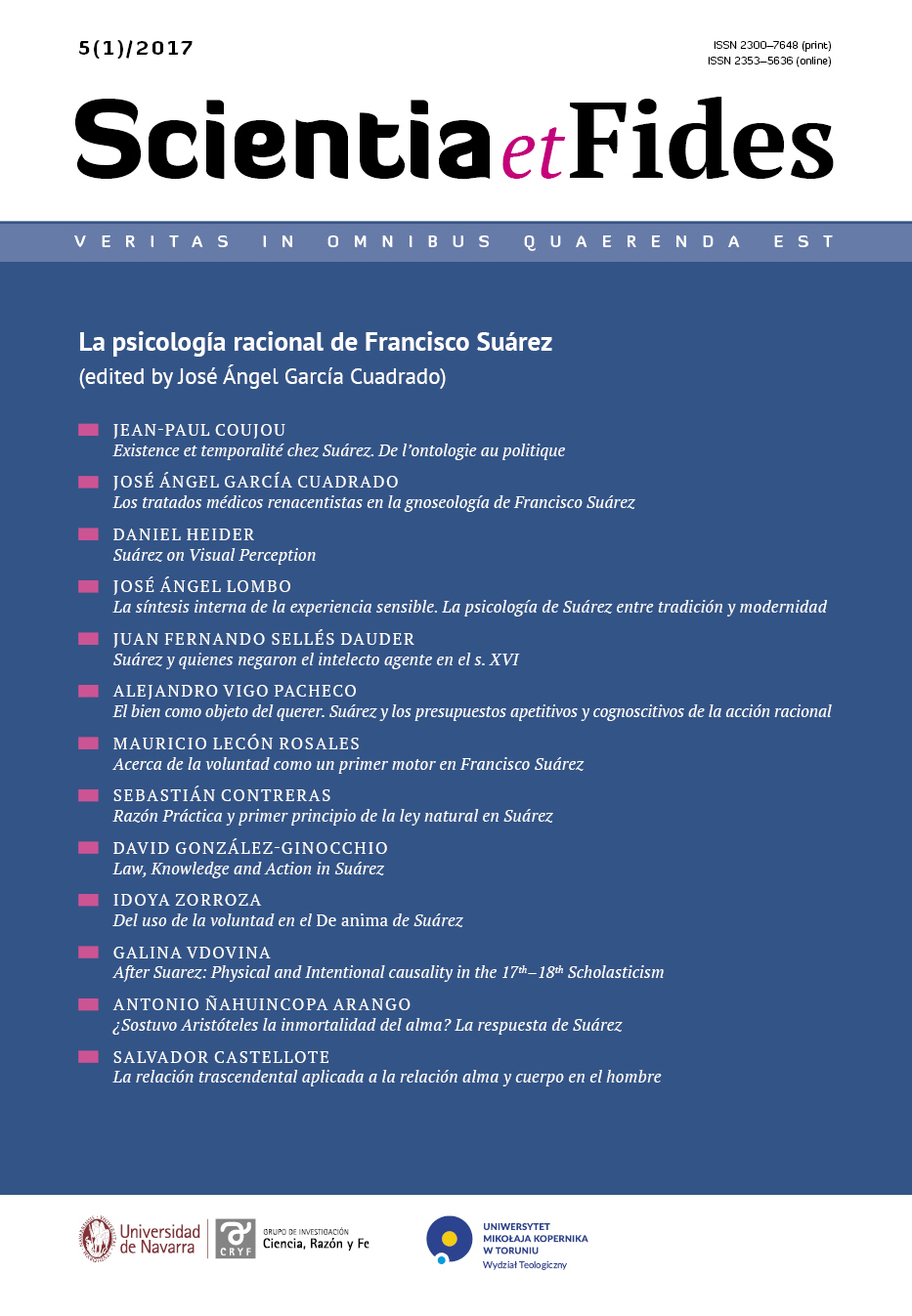La voluntad como primer motor creado en Francisco Suárez
Keywords
freedom, actuality, potentiality, action, efficient causeAbstract
The will as first mover created in Francisco Suárez
The aim of this paper is to show that Francisco Suarez’s claim that the will is the prime mover of the human actions is grounded in his own metaphysical system. For that purpose, I argue that the will is not necessitated to act by any extrinsic efficient cause: nor by God’s grace, neither by the intellect, the law or fate. For all these active principles are either just a necessary condition for the will’s act or something that necessitates the practical act of the intellect by which it guides the will, but does not affects the will itself. On the other hand, I argue that Suárez’s account on potency and act allows conceiving an efficient cause that is able to determine itself. Besides Suárez distinction between the transcendental sense of potency and act and the predicamental one –among which only the latter is relevant for this matte—, for him act does not perfect potency. Then the will can simultaneously be denominated patient and agent regarding its own action since it does not imply that the will can give itself something it previously lacked.
References
Carraud, Vincent. 2002. Causa sive ratio. La raison de la cause, de Suárez a Leibniz. París: Presses Universitaires de France.
Coujou, Jean-Paul1. 2012. “La compréhension suarézienne de la liberté de la volonté et les limites de l'héritage augustinien du libre arbitre.” 241–282. Perpignan, France: Artège.
Coujou, Jean-Paul2. 2012. “La question de l’expérience de la praxis chez Suárez.” En Droit, anthropologie & politique chez Suárez, 207–239. Perpignan, France: Artège.
Doyle, John P. 1984. “Prolegomena to a Study of Extrinsic Denomination in the Work of Francis Suárez, S.J.” Vivarium 22: 119-160.
Fernández Burillo, Santiago. 1997. “Las Disputaciones Metafísicas de Francisco Suárez S.I., su inspiración y algunas de sus líneas maestras. En el IV centenario de la primera edición (1597-1997)”. Revista Española de Filosofía Medieval 4: 65–86.
Freddoso, Alfred, trad. 1994. On Efficient Causality. Metaphysical Disputations 17, 18, 19. New Haven, Londrés: Yale University Press.
González Ayesta, Cruz. 2011. “Escotismo y tomismo en la interpretación suareciana del entendimiento como potencia.” Revista Española de Filosofía Medieval 18: 137–150.
Hellín, José S.J. 1948. “Sobre el tránsito de la potencia activa al acto según Suárez.” Razón y fe 138: 353–407.
Knuuttila, Simo. 2015. “Suárez’s Psychology.” En A Companion to Francisco Suárez, editado por Victor M. Salas and Robert L. Fastiggi, 192–220. Leiden: Brill.
Lecón, Mauricio. 2013. “Francis Suárez on the Efficiency of Substantial Forms.” The Review of Metaphysics 265: 107-124.
Lecón, Mauricio. 2016. “Metaphysics and Pscyhology of the Making of Law in Francisco Suárez.” En The Concept of Law (lex) in the Moral and Political Thought of the ‘School of Salamanca’, editado por Kirstin Bunge, Marko J. Fuchs, Danaë Simmermacher y Anselm Spindler, 249-269. Leiden: Brill.
Olivo, Gilles. 1997. “L’efficience en cause: Suárez, Descartes et la question de la causalité.” En Descartes et le Moyen Age, editado por Joël Biard and Roshdi Rashed, 91–105. París: Vrin.
Renemann, Michael. 2015. “Suárez’s Doctrine of Concepts. How Divine and Human Intellection are Interwined.” En A Companion to Francisco Suárez, editado por Victor M. Salas and Robert L. Fastiggi, 313–335. Leiden–Boston: Brill.
Schnepf, Robert. 2001. “Zum kausalen Vokabular am Vorabend der ‘wissenschaftlichen Revolution’ des 17. Jahrhunderts: Der Ursachenbegriff bei Galilei und die ‘aristotelische’ causa efficiens im System der Ursachen bei Suárez.” In Kausalität und Naturgesetz in der frühen Neuzeit, edited by Andreas Hüttemann, 15–46. Stuttgart: Studia Leibnitiana Sonderheft 31.
Suárez, Francisco. 1992. De anima (3 vols), traducido y editado por Salvador Castellote Cubells. Madrid: Sociedad de Estudios y Publicaciones.
Suárez, Francisco. 1972. De legibus. Vol. 2, traducido y editado por Luciano Pereña et al. Madrid: Consejo Superior de Investigaciones Científicas, Instituto Francisco de Vitoria.
Suárez, Francisco. 1960. Disputaciones metafísicas (7 vols), traducido y editado por Sergio Rábade Romeo et al. Madrid: Gredos.
Suárez, Francisco. 1856. “De bonitate et malitia humanorum actuum.” En Opera omnia. Vol. 4, editado por Luis Vivés. París.
Suárez, Francisco. 1856. “De voluntario et involuntario.” En Opera omnia. Vol. 4, editado por Luis Vivés. París.
Vigo, Alejandro. 2011. “Intelecto, deseo y acción según Francisco Suárez.” En Razón práctica y derecho, editado por Juan Cruz Cruz, 11–30. Pamplona: Eunsa.
Downloads
Published
How to Cite
Issue
Section
License
CC BY ND 4.0. The Creator/Contributor is the Licensor, who grants the Licensee a non-exclusive license to use the Work on the fields indicated in the License Agreement.
- The Licensor grants the Licensee a non-exclusive license to use the Work/related rights item specified in § 1 within the following fields: a) recording of Work/related rights item; b) reproduction (multiplication) of Work/related rights item in print and digital technology (e-book, audiobook); c) placing the copies of the multiplied Work/related rights item on the market; d) entering the Work/related rights item to computer memory; e) distribution of the work in electronic version in the open access form on the basis of Creative Commons license (CC BY-ND 3.0) via the digital platform of the Nicolaus Copernicus University Press and file repository of the Nicolaus Copernicus University.
- Usage of the recorded Work by the Licensee within the above fields is not restricted by time, numbers or territory.
- The Licensor grants the license for the Work/related rights item to the Licensee free of charge and for an unspecified period of time.
FULL TEXT License Agreement
Stats
Number of views and downloads: 713
Number of citations: 0



